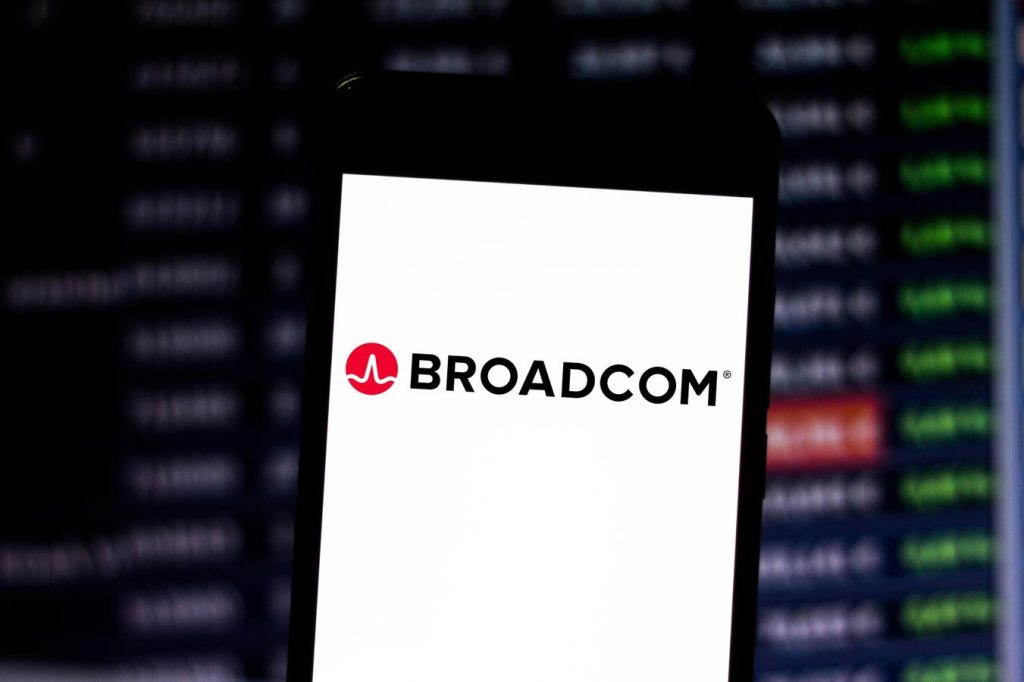Shares of Broadcom (AVGO) this week hit a new record high of $1,284 as investors applaud the chipmaker’s more diversified revenue stream following the recently completed $61-billion acquisition of cloud-software giant VMware and eye new growth opportunities in AI.
Going forward, there will be a greater emphasis placed on higher-margin infrastructure software. At the same time, Broadcom’s large networking unit, representing 30% of fiscal 2023 (October) revenue, will remain a key growth driver. Broadcom also has a presence in wireless chips, server storage connectivity and broadband.
In FY’23, Broadcom’s total software revenue of $7.6 billion represented 21% of total revenue. Broadcom already owns CA, Symantec and Brocade. For FY’24, Broadcom said it expects total revenue of around $50 billion, including software revenue of $20 billion (40% of total revenue). Within the software segment, VMware is expected to contribute $12 billion of FY’24 revenue (after spinning off two VMware units that make up about $2 billion in revenue).
Broadcom estimates that it will take about 12 months to fully integrate VMware. The cost of the integration could total $1 billion. Broadcom will refocus on VMware’s core business of creating private and hybrid cloud environments for large enterprises. VMware has the leading technology to virtualize entire datacenters (not just the compute function) and create on-premises private clouds for customers, according to Broadcom CEO Hock Tan.
The strategy is to enable enterprises to run their applications across various datacenters as well as on public clouds by consuming VMware’s Cloud Foundation software stack. Managing workloads under a single abstraction layer across a diversity of hardware creates cost reductions (especially on the hardware side), which Tan says represents the true value of VMware. To attract and keep workloads, Tan notes that Broadcom will invest in a rich catalog of microservices tools.
As part of the VMware integration, Broadcom is shifting the unit to a subscription model. Sales of new perpetual licenses and support renewals have ended. Today, over 60% of VMware customers are on perpetual licenses. Customers can continue to use perpetual licenses with active support contracts. But Broadcom is working with customers to help them “trade in” their perpetual products in exchange for the new subscription offerings.
These model transitions can be tricky to engineer. Some customers will seek out alternative vendors. Given that VMware is already so well-established at many large enterprises and constantly innovating across its product portfolio, Broadcom is hoping the subscription transition will entail limited disruption.
On the technology front, VMware has been deepening its efforts to empower customers to adopt generative AI. It collaborated with Intel to help enterprises build AI models and boost AI performance. It also partnered with IBM’s Red Hat to enable faster generative AI capabilities.
Generative AI is already powering growth in Broadcom’s semiconductor business. In the October quarter, networking revenue rose 23% to $3.1 billion, with growth primarily driven by strong demand from hyperscalers for Broadcom’s custom AI accelerators as well as networking switches, routers and network interfaces dedicated to scaling AI datacenters. Ethernet, the standard protocol in front-end networks, is also being deployed by hyperscalers in their AI networks.
In FY’23, Broadcom’s networking revenue advanced 21% to $10.8 billion. The company is forecasting that networking growth in the current fiscal year will accelerate nicely to 30%, driven by the increasing deployment of network connectivity and an expansion of AI accelerator demand from hyperscalers.
After doubling in 2023, Broadcom shares so far in 2024 have advanced 10%. With this strong performance, the stock, recently trading around $1,230, is sitting just below many bullish Wall Street price targets. For example, Truist recently raised its Broadcom target to $1,240 from $1,015 based on a positive view of the VMware business and the company’s “newfound AI exposure.”
In December, BofA noted Broadcom’s big AI opportunity when it raised its target to $1,250 from $1,200. Bernstein earlier this month boosted its target to $1,250 from $1,150 because it likes Broadcom’s strategy to drive growth at VMware while also taking out costs. With a target of $1,250, Mizuho notes that Broadcom boasts industry-leading margins and free cash flow. In FY’23, the company delivered enviable free cash flow totaling $17.6 billion, representing a healthy margin of 49%.
Goldman Sachs recently reinstated coverage of Broadcom at ‘Buy’ with a price target of $1,325. The firm is bullish on Broadcom’s AI-related businesses, optimistic about a cyclical recovery in the company’s classic semiconductor business and believes VMware synergies can drive operating margin expansion and earnings growth.
Read the full article here






